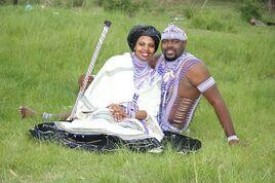科薩語
非洲南部科薩族語言
科薩語,使用人口大約790萬人,約佔南非人口的百分之18,主要集中在南非南部的兩個省份,該語言現在是拉丁字母書寫。
另外,科薩語是南非前總統納爾遜·曼德拉的母語。
像其它班圖語言一樣,科薩語是帶有聲調的語言,它具有兩種聲調。也就是說,同一組母音和輔音的組合,如果用升調或降調,高音或低音發聲,表達的是不同的意思。科薩語一個最顯著的特點,是它的吸氣輔音(click consonants)。這種語言的名稱Xhosa就是用一個吸氣輔音開頭的。在採用拉丁字母拼寫科薩語的系統中,用三個字母來表達吸氣輔音:c,x,和q。
在十六世紀之前,說科薩語的人就居住在南非的海岸線一帶。說科薩語的部族稱他們自己使用的語言為amaXhsa或isiXhosa。幾乎所有帶吸氣輔音的語言都是克瓦桑族語(Khoisan languages)。科薩語中的吸氣輔音表明,它是克瓦桑族語的近親。大約有15%的辭彙來自克瓦桑族語。到了近代,科薩語又從南非語(即南非荷蘭語)和英語中借用了很多辭彙。
目前,在初小教育和部分高小教育中,科薩語是主要的語言。但是,進入更高一級的教育后,教育用語便為英語所取代。儘管在學校中,還有科薩語的學術團體,並開設科薩語的課程。在南非大學,授課用語是英語和南非語,而學生可以當作一門課程來選修科薩語。學這門功課的學生,可能他們的母語就是科薩語,也可能不是。
第一部科薩語的《聖經》是1859年由英國人Henry Hare Dugmore與當地人合作翻譯出版的。Henry Hare Dugmore能夠講流利的科薩語。目前,科薩語的報刊和雜誌隨處可見,也有許多散文、詩歌等文學作品。南非廣播公司每天播出科薩語的電視和廣播節目。用科薩語唱歌的著名歌手Miriam Makeba,以特有的帶吸氣輔音的歌調,使其聲名遠揚到南非之外的世界各國。
科薩語樣本:
Bonke abantu bazalwa bekhululekile belingana ngesidima nangokweemfanelo. Bonke abantu banesiphiwo sesazela nesizathu sokwenza isenzo ongathanda ukuba senziwe kumzalwane wakho.
對應英文:
All human beings are born free and equal in dignity and rights. They are endowed with reason and conscience and should act towards one another in a spirit of brotherhood.
| English | isiXhosa (Xhosa) |
| Welcome | Siya namkela nonke |
| Hello | Molo |
How are you? Fine thanks, and you? | Unjani? |
Ndiyaphila, enkosi. Kunjani kuwe? Ndiphilile enkosi, unjani wena? | |
| Long time no see | Kudala ndakugqibela |
What's your name? My name is ... | Ngubani igama lakho? Igama lakho? |
| Igama lam ngu ... | |
Where are you from? I'm from ... | Uvela phi? |
| Ndivela e... | |
| Pleased to meet you | Ndiyavuya ukukwazi |
| Good afternoon | Uben' emva kwemini entle / Ube nemini emnandi |
| Good evening | Ubusuku obuhle |
| Good night | Rhonanai / Ulale kakuhle |
| Goodbye | Hamba kakuhle (go well) Sala kakuhle (stay well) |
| Good luck | Amathamsanqa |
| Cheers/Good health! | Impilo! |
| Have a nice day | Ubenemini emnandi |
| Bon appetit | Ukonwabele ukutya kwakho |
| Bon voyage | Uhambe kakuhle |
| I don't understand | Andiva |
| Please speak more slowly | Khawucothise |
| Please say that again | Ndicela uphinde / Khawuphinde utsho / Yitsho kaphinda |
| Please write it down | Cela uyibhale phantsi |
Do you speak Xhosa? Yes | Uyakwazi ukuthetha isiXhosa? |
| Ewe | |
| Do you speak English? | Uyakwazi ukuthetha isiNgesi? |
| How do you say ... in Xhosa? | Uthini …ngesiXhosa? |
| Excuse me | Uxolo! Ndixolele! |
| How much is this? | Yimalini? |
| Sorry | Ndicela uxolo |
Thank you Response | Ndiyabulela / Enkosi |
| Wamkelekile | |
| Where's the toilet? | Liphi igumbi langasese? |
This gentleman/lady will pay for everything | uMfana uzakubhatala yonke into / uBhuti uzakubhatala yonke into Inenekazi lizokubhatala yonke into / Ilady lokubhatala yonke into |
Would you like to dance with me? | Ungathanda ukudansa? |
| I love you | Ndiya kuthanda |
| Get well soon | Uphile ngokukhawuleza |
| Leave me alone! | Ndiyeke! |
| Help! | Nceda! |
| Call the police! | Biza amapolisa! |
Merry Christmas and Happy New Year | Siniqwenelela Ikrisimesi Emnandi Nonyaka Omtsha Ozele Iintsikelelo |
| Happy Birthday | Imini emnandi kuwe |
One language is never enough | Ulwimi olunye zange lonela |
數詞
| 1 | Kiet | Akpa |
| 2 | Iba | Udiana Akpa |
| 3 | Ita | ɔyɔhɔ Akpa Ita |
| 4 | Inaŋ | ɔyɔhɔ Akpa Inaŋ |
| 5 | Ition | |
| 6 | Itiokiet | |
| 7 | Itiaba | |
| 8 | Itiaita | |
| 9 | Usukkiet | |
| 10 | Duop | |
| 11 | Duopekiet | |
| 12 | Duopeba | |
| 13 | Duopeta | |
| 14 | Duopenaŋ | |
| 15 | Efut | |
| 16 | Efutkiet | |
| 17 | Efureba | |
| 18 | Efureta | |
| 19 | Efurenaŋ | |
| 20 | Edip | |
| 21 | Edip Ye Kiet | |
| 22 | Edip Ye Iba | |
| 23 | Edip Ye Ita | |
| 24 | Edip Ye Inaŋ | |
| 25 | Edip Ye Ition | |
| 26 | Edip Ye Itiokiet | |
| 27 | Edip Ye Itiaba | |
| 28 | Edip Ye Itiaita | |
| 29 | Edip Ye Inaŋ | |
| 30 | Edip Ye Duop | |
| 31 | Edip Ye Duopkiet | |
| 32 | Edip Ye Duopeba | |
| 33 | Edip Ye Duopeta | |
| 34 | Edip Ye Duopenaŋ | |
| 35 | Edip Ye Efut | |
| 36 | Edip Ye Efutkiet | |
| 37 | Edip Ye Efureba | |
| 38 | Edip Ye Efureta | |
| 39 | Edip Ye Efurenaŋ | |
| 40 | Aba | |
| 50 | Aba Ye Duop | |
| 60 | Ata | |
| 70 | Ata Ye Duop | |
| 80 | Anaŋ | |
| 90 | Anaŋ Ye Duop | |
| 100 | Ikie | |
| 101 | Ikie Ye Kiet | |
| 110 | Ikie Ye Duop | |
| 112 | Ikie Ye Duopeba | |
| 120 | Ikie Ye Edip | |
| 150 | Ikie Ye Aba Ye Duop | |
| 200 | Ikie Iba | |
| 300 | Ikie Ita | |
| 400 | Ikie Inaŋ | |
| 500 | Ikie Ition | |
| 600 | Ikie Itiokiet | |
| 700 | Ikie Itiaba | |
| 800 | Ikie Itiaita | |
| 900 | Ikie Usukiet | |
| 1000 | Tɔsin |
